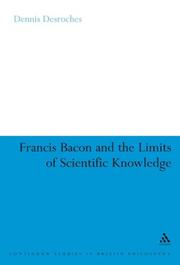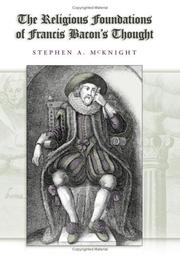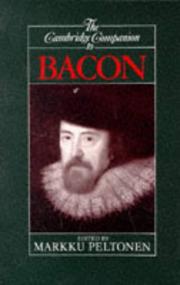| Listing 1 - 10 of 51 | << page >> |
Sort by
|
Book
ISBN: 1282975293 9786612975295 0739144839 9780739144831 9780739144817 0739144812 9781282975293 6612975296 Year: 2010 Publisher: Lanham Lexington Books
Abstract | Keywords | Export | Availability | Bookmark
 Loading...
Loading...Choose an application
- Reference Manager
- EndNote
- RefWorks (Direct export to RefWorks)
Francis Bacon's 'Inquiry Touching Human Nature' is an engagement at a fundamental level with the political and philosophic thought of one of the founders of modernity, Francis Bacon. Bacon had a comprehensive vision of the human situation. And because he saw the costs or dangers of modern life as clearly as he predicted its achievements and boons, Bacon is a thinker who addresses directly and deeply our own perplexities.
Bacon, Francis, --- Bacon de Verulam, François --- Bacon, François
Book
ISBN: 1139149660 1108040764 Year: 1872 Publisher: Place of publication not identified : Cambridge : publisher not identified, Cambridge University Press
Abstract | Keywords | Export | Availability | Bookmark
 Loading...
Loading...Choose an application
- Reference Manager
- EndNote
- RefWorks (Direct export to RefWorks)
Francis Bacon (1561-1626), the English philosopher, statesman and jurist, is best known for developing the empiricist method which forms the basis of modern science. Bacon's writings concentrated on philosophy and judicial reform. His most significant work is the Instauratio Magna comprising two parts - The Advancement of Learning and the Novum Organum. The first part is noteworthy as the first major philosophical work published in English (1605). James Spedding (1808-81) and his co-editors arranged this fourteen-volume edition, published in London between 1857 and 1874, not in chronological order but by subject matter, so that different volumes would appeal to different audiences. The material is divided into three parts: philosophy and general literature; legal works; and letters, speeches and tracts relating to politics. Volume 13, published in 1872, contains Bacon's papers from 1616 to 1618 and relate to his appointment as Lord Chancellor, and England's relations with Ireland and Spain.
Philosophers --- Bacon, Francis, --- Scholars --- Bacon de Verulam, François --- Bacon, François
Book
ISBN: 113914961X 1108040713 Year: 1861 Publisher: Place of publication not identified : Cambridge : publisher not identified, Cambridge University Press
Abstract | Keywords | Export | Availability | Bookmark
 Loading...
Loading...Choose an application
- Reference Manager
- EndNote
- RefWorks (Direct export to RefWorks)
Francis Bacon (1561-1626), the English philosopher, statesman and jurist, is best known for developing the empiricist method which forms the basis of modern science. Bacon's writings concentrated on philosophy and judicial reform. His most significant work is the Instauratio Magna comprising two parts - The Advancement of Learning and the Novum Organum. The first part is noteworthy as the first major philosophical work published in English (1605). James Spedding (1808-81) and his co-editors arranged this fourteen-volume edition, published in London between 1857 and 1874, not in chronological order but by subject matter, so that different volumes would appeal to different audiences. The material is divided into three parts: philosophy and general literature; legal works; and letters, speeches and tracts relating to politics. Volume 8, published in 1862, contains letters, and miscellaneous writings relating to Bacon's political duties from 1561 to 1594, offering a valuable insight into Elizabethan statecraft.
Philosophers --- Scholars --- Bacon, Francis, --- Bacon de Verulam, François --- Bacon, François
Book
ISBN: 1139149652 1108040756 Year: 1869 Publisher: Place of publication not identified : Cambridge : publisher not identified, Cambridge University Press
Abstract | Keywords | Export | Availability | Bookmark
 Loading...
Loading...Choose an application
- Reference Manager
- EndNote
- RefWorks (Direct export to RefWorks)
Francis Bacon (1561-1626), the English philosopher, statesman and jurist, is best known for developing the empiricist method which forms the basis of modern science. Bacon's writings concentrated on philosophy and judicial reform. His most significant work is the Instauratio Magna comprising two parts - The Advancement of Learning and the Novum Organum. The first part is noteworthy as the first major philosophical work published in English (1605). James Spedding (1808-81) and his co-editors arranged this fourteen-volume edition, published in London between 1857 and 1874, not in chronological order but by subject matter, so that different volumes would appeal to different audiences. The material is divided into three parts: philosophy and general literature; legal works; and letters, speeches and tracts relating to politics. Published in 1869, Volume 12 contains Bacon's letters and writings between 1613 and 1616, which primarily relate to his appointment as Attorney General.
Philosophers --- Bacon, Francis, --- Scholars --- Bacon de Verulam, François --- Bacon, François
Book
ISBN: 1139149644 1108040748 Year: 1868 Publisher: Place of publication not identified : Cambridge : publisher not identified, Cambridge University Press
Abstract | Keywords | Export | Availability | Bookmark
 Loading...
Loading...Choose an application
- Reference Manager
- EndNote
- RefWorks (Direct export to RefWorks)
Francis Bacon (1561-1626), the English philosopher, statesman and jurist, is best known for developing the empiricist method which forms the basis of modern science. Bacon's writings concentrated on philosophy and judicial reform. His most significant work is the Instauratio Magna comprising two parts - The Advancement of Learning and the Novum Organum. The first part is noteworthy as the first major philosophical work published in English (1605). James Spedding (1808-81) and his co-editors arranged this fourteen-volume edition, published in London between 1857 and 1874, not in chronological order but by subject matter, so that different volumes would appeal to different audiences. The material is divided into three parts: philosophy and general literature; legal works; and letters, speeches and tracts relating to politics. Volume 11, published in 1868, contains Bacon's political writings and letters from 1608 to 1613, including his treatise on the Irish plantations presented to King James I.
Philosophers --- Bacon, Francis, --- Scholars --- Bacon de Verulam, François --- Bacon, François
Book
ISBN: 1139149636 110804073X Year: 1868 Publisher: Place of publication not identified : Cambridge : publisher not identified, Cambridge University Press
Abstract | Keywords | Export | Availability | Bookmark
 Loading...
Loading...Choose an application
- Reference Manager
- EndNote
- RefWorks (Direct export to RefWorks)
Francis Bacon (1561-1626), the English philosopher, statesman and jurist, is best known for developing the empiricist method which forms the basis of modern science. Bacon's writings concentrated on philosophy and judicial reform. His most significant work is the Instauratio Magna comprising two parts - The Advancement of Learning and the Novum Organum. The first part is noteworthy as the first major philosophical work published in English (1605). James Spedding (1808-81) and his co-editors arranged this fourteen-volume edition, published in London between 1857 and 1874, not in chronological order but by subject matter, so that different volumes would appeal to different audiences. The material is divided into three parts: philosophy and general literature; legal works; and letters, speeches and tracts relating to politics. Volume 10, published in 1868, contains Bacon's letters and political writings from 1601 to 1607. Of note is Bacon's support of the union of England and Scotland.
Philosophers --- Bacon, Francis, --- Scholars --- Bacon de Verulam, François --- Bacon, François

ISBN: 0826486819 Year: 2006 Publisher: London Continuum
Abstract | Keywords | Export | Availability | Bookmark
 Loading...
Loading...Choose an application
- Reference Manager
- EndNote
- RefWorks (Direct export to RefWorks)
Science --- Methodology --- Bacon, Francis --- Bacon de Verulam, François --- Bacon, François --- Influence. --- Knowledge --- Science.

ISBN: 0826264999 9780826264992 0826216099 9780826216090 Year: 2006 Publisher: Columbia, Mo. University of Missouri Press
Abstract | Keywords | Export | Availability | Bookmark
 Loading...
Loading...Choose an application
- Reference Manager
- EndNote
- RefWorks (Direct export to RefWorks)
"Presents close analysis of eight of Francis Bacon's texts in order to investigate the relation of his religious views to his instauration. Attempts to correct the persistent misconception of Bacon as a secular modern who dismissed religion in order to promote the human advancement of knowledge"--Provided by publisher.
Philosophy. --- Mental philosophy --- Humanities --- Bacon, Francis, --- Bacon de Verulam, François --- Bacon, François --- Religion.

ISBN: 9780826216090 0826216099 Year: 2006 Publisher: Columbia (Mo.) University of Missouri press
Abstract | Keywords | Export | Availability | Bookmark
 Loading...
Loading...Choose an application
- Reference Manager
- EndNote
- RefWorks (Direct export to RefWorks)
"Presents close analysis of eight of Francis Bacon's texts in order to investigate the relation of his religious views to his instauration. Attempts to correct the persistent misconception of Bacon as a secular modern who dismissed religion in order to promote the human advancement of knowledge"--Provided by publisher.
Bacon, Francis, --- Religion. --- Bacon de Verulam, François --- Bacon, François --- Bacon, Francis --- Bacon, Francis, - 1561-1626. --- Bacon, Francis, - 1561-1626. - Religion.

ISBN: 052143498X 052143534X 9780521435345 9781139000659 9780521434980 Year: 1996 Publisher: Cambridge Cambridge University Press
Abstract | Keywords | Export | Availability | Bookmark
 Loading...
Loading...Choose an application
- Reference Manager
- EndNote
- RefWorks (Direct export to RefWorks)
Bacon, Francis --- Bacon, Francis, --- Bacon de Verulam, François --- Bacon, François --- Bacon, Francis, - 1561-1626. --- Bacon, Francis, - 1561-1626
| Listing 1 - 10 of 51 | << page >> |
Sort by
|

 Search
Search Feedback
Feedback About UniCat
About UniCat  Help
Help News
News